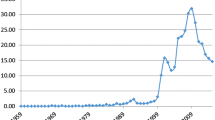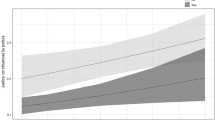Abstract
The study analyzed large-scale data from several sources, covering more than 42,000 individuals in 28 Asian countries to comparatively assess the effects of country-level variables on Asians’ confidence in their court systems. Three HLM ordinal logistic regression models were fitted instantaneously to achieve the objective of the study. Results revealed that a country’s levels of democracy and peacefulness had a significant and positive relationship with citizens’ confidence in the courts. Moreover, citizens living in countries with absolute press freedom reported greater levels of confidence. However, individuals living in countries that were highly corrupt tended to have reduced confidence in the courts. The impact of terrorism on a country had no influence on public confidence.
Similar content being viewed by others
Notes
These countries were Azerbaijan, Bahrain, Armenia, China, Taiwan, Cyprus, Georgia, Palestine, Hong Kong, India, Iraq, Japan, Kazakhstan, Jordon, South Korea, Kuwait, Kyrgyzstan, Lebanon, Malaysia, Pakistan, Philippines, Qatar, Russia, Singapore, Thailand, Turkey, Uzbekistan, and Yemen.
The GTI is based on data from the Global Terrorism Database (GTD), which is collected and collated by the National Consortium for the Study of Terrorism and Responses to Terrorism.
The intra-class correlation coefficient (ICC) is computed by using the linear threshold model method. Based on this method, ICC is calculated as VB/(VB + 3.29), where VB is the between-group variance.
References
Aydın Çakır, A., & Şekercioğlu, E. (2016). Public confidence in the judiciary: the interaction between political awareness and level of democracy. Democratization, 23(4), 634–656.
Barua, V. (2009). Accountability and transparency of the federal judiciary. The Criminal Law Bulletin, 45(3), 613–626.
Benesh, S. C. (2006). Understanding public confidence in American courts. The Journal of Politics, 68, no., 3(2006), 697–707.
Benesh, C. S., & Howell, E. S. (2001). Confidence in the courts: a comparison of users and non-users. Behavioral Sciences and the Law, 19(2), 199–214. https://doi.org/10.1002/bsl.437.
Boateng, F. D. (2016). Neighborhood-level effects on trust in the police: a multilevel analysis. International criminal justice review, 26(3), 217–236.
Boateng, F. D. (2017). Police legitimacy in Africa: a multilevel multinational analysis. Policing and Society, 1–16.
Boateng, F. D., & Adjorlolo, S. (2019). Judicial Trustworthiness in Africa: do macro-level conditions matter? Crime & Delinquency, 65(12), 1689–1710.
Boateng, F. D., & Makin, D. A. (2016). Where do we stand? An exploratory analysis of confidence in African Court Systems. International Journal for Crime, Justice and Social Democracy, 5(4), 132–153.
Boateng, F. D., Lee, H. D., & Abess, G. (2016). Analyzing citizens’ reported levels of confidence in the police: a cross-national study of public attitudes toward the police in the United States and South Korea. Asian Journal of Criminology, 11(4), 289–308.
Burton, C. (1990). Political and Social Change in China Since 1978. Westport: Greenwood Press.
Cao, L., & Dai, M. (2006). Confidence m the police: where does Taiwan rank in the world? Asian Journal of Criminology, 1, 71–84.
Cao, L., & Hou, C. (2001). A comparison of confidence in the police in China and in the United States. Journal of Criminal Justice, 29, 87–99.
Carlson, M., & Turner, M. (2008). Public support for democratic governance in Southeast Asa. Asian Journal of Political Science, 16(3), 219–239.
Chang, E. C., & Chu, Y. H. (2006). Corruption and trust: exceptionalism in Asian democracies? The Journal of Politics, 68(2), 259–271.
Choi, S.-W., & James, P. (2006). Media Openness, democracy and militarized inter-state disputes: an empirical analysis. British Journal of Political Science, 37, 23–46.
Citrin, J., & Green, D. P. (1986). Presidential leadership and the resurgence of trust in government. British Journal of Political Science, 16, no., 4(1986), 431–453.
Dugard, J. (2006). Court of first instance? Toward a pro-poor jurisdiction for the South African Constitutional Court. South African Journal on Human Rights, 22(2), 261–282.
Economist Intelligence Unit. (2016). Democracy index 2016: Democracy at a standstill. New York: Author.
Freedom House. (2016). Freedom in the World. Washington: Freedom House.
Fukurai, H. (2007). The rebirth of Japan’s petit quasi-jury and grand jury systems: a cross- national analysis of legal consciousness and the law participatory experience in Japan and the US. Cornell International Law Journal, 40, 315.
Fukurai, H., & Krooth, R. (2010). What brings people to the courtroom? Comparative analysis of people’s willingness to serve as jurors in Japan and the US. International Journal of Law, Crime and Justice, 38(4), 198–215.
Fukurai, H., Chan, K. W., & Miyazawa, S. (2010). The resurgence of lay adjudicatory systems in East Asia. APLPJ, 12.
Gallup Poll. (2014). Available at http://www.gallup.com (accessed on May 15, 2017).
Gibson, J. L. (1989). Understandings of justice: Institutional legitimacy, procedural justice, and political tolerance. Law and Society Review, 23(3), 469–496.
Global Peace Index. (2016). Measuring peace, its causes and its economic value. Institute for Economic & Peace. Retrieved at http://economicsandpeace.org/.
Hakverdian, A., & Mayne, Q. (2012). Institutional trust, education and corruption: a micro-macro interactive approach. The Journal of Politics, 74(3), 739–750.
Hough, M., & Roberts, J. (2004). Confidence in justice: an international review. London: Home Office.
Hsieh, M.-L., & Boateng, F. D. (2015). Perceptions of democracy and trust in the criminal justice system: a comparison between mainland China and Taiwan. International Criminal Justice Review, 25(2), 153–173. https://doi.org/10.1177/1057567715570050.
Huang, K. C., & Lin, C. C. (2013). Rescuing confidence in the judicial system: introducing lay participation in Taiwan. Journal of Empirical Legal Studies, 10(3), 542–569.
Kovalev, N., & Suleymenova, G. (2010). New Kazakhstani quasi-jury system: challenges, trends and reforms. International Journal of Law, Crime and Justice, 38(4), 261–278.
Lai, Y. L., Cao, L., & Zhao, J. M. (2010). The impact of political entity on confidence in legal authorities: a comparison between China and Taiwan. Journal of Criminal Justice, 38, 934–941.
Lee, J.-H. (2009). Getting citizens involved: civil participation in judicial decision-making in Korea. East Asia Law Rev., 177.
Leechaianan, Y., Khruakham, S., & Hoover, L. T. (2012). Public confidence in Thailand’s legal authorities. International Journal of Police Science & Management, 14(3), 246–263.
Maruta, T. (2004). Saiban-in Seido [The Quasi-Jury System]. Tokyo: Heibonsha Shinsho.
Park, K., Han, Y. H., & Seong, Y. R. (2010). The effect of double judgments on public confidence in court decisions for the trial by citizen-participation in Korea. International Journal of Law, Crime and Justice, 38(4), 166–174.
Roberts, J., & Stalans, L. (1997). Public opinion, crime, and criminal justice. Boulder: Westview.
Sherman, L. (2002). Trust and confidence in criminal justice. National Institute of Justice journal no., 248, 22–31.
Stoutenborough, W. J., & Haider-Markel, P. D. (2008). Public confidence in the U.S. Supreme Court: a new look at the impact of Court decisions. The Social Science Journal, 45, 28–47.
Tyler, T. R. (1990). Why people obey the law. New Haven: Yale University Press.
Van Belle, D. A. (1997). Press freedom and the democratic peace. Journal of Peace Research, 34(4), 405–414.
Van De Walle, V. S. (2009). Confidence in the criminal justice system: does experience count? British Journal of Criminology, 49(3), 384–398. https://doi.org/10.1093/bjc/azp001.
Wang, Z., & Fukurai, H. (2010). Popular legal participation in China and Japan. International Journal of Law, Crime and Justice, 38(4), 236–260.
Wong, Y.-C. (2004). One country, two systems in crisis: Hong Kong’s transformation since the handover. Lanham: Lexington Books.
Wu, Y. (2014). The impact of media on public trust in legal authorities in China and Taiwan. Asian Journal of Criminology, 9, 85–101.
Wu, Y., Poteyeva, M., & Sun, I. Y. (2012). Trust in police: a comparison of China and Taiwan. International Journal of Comparative and Applied Criminal Justice, 36(3), 189–210.
Author information
Authors and Affiliations
Corresponding author
Ethics declarations
Conflict of Interest
The author declares that they have no conflict of interest.
Ethical Approval
All procedures performed in studies involving human participants were in accordance with the ethical standards of the institutional and/or national research committee and with the 1964 Helsinki declaration and its later amendments or comparable ethical standards.
Informed Consent
Informed consent was obtained from all individual participants included in the study.
Additional information
Publisher’s Note
Springer Nature remains neutral with regard to jurisdictional claims in published maps and institutional affiliations.
Rights and permissions
About this article
Cite this article
Boateng, F.D. Legitimizing the Judiciary: a Multilevel Explanation of Factors Influencing Public Confidence in Asian Court Systems. Asian J Criminol 15, 285–299 (2020). https://doi.org/10.1007/s11417-020-09316-1
Received:
Accepted:
Published:
Issue Date:
DOI: https://doi.org/10.1007/s11417-020-09316-1




